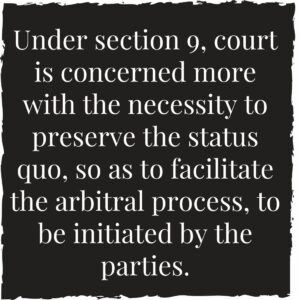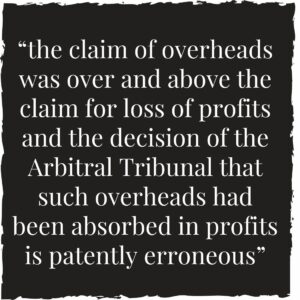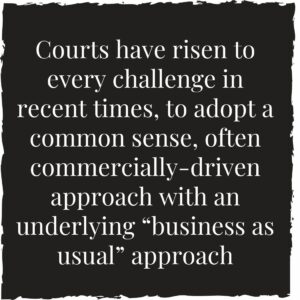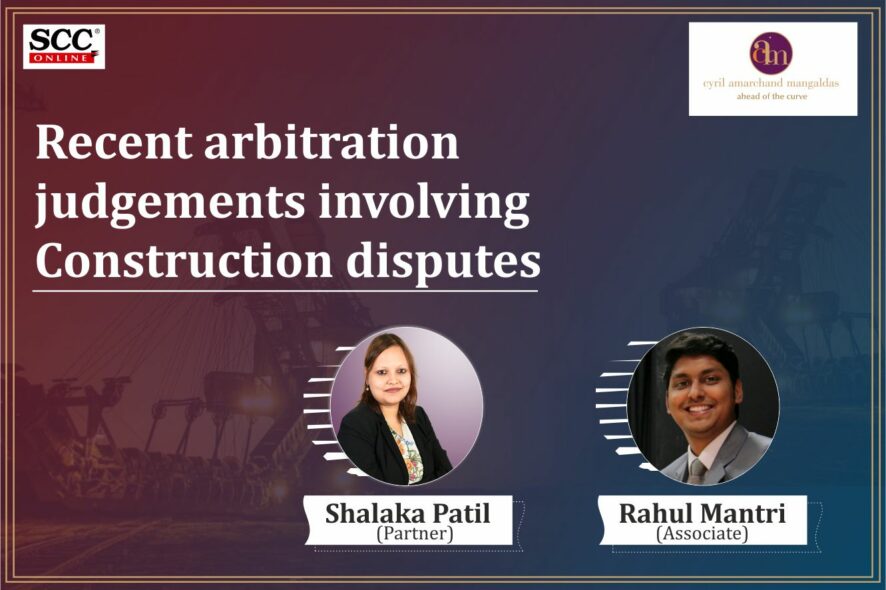It is no secret that the infrastructure market has grown exponentially in India[1] and as EOTs, delays and cost overruns occur, so do disputes. We examine in this piece some recent, interesting judgments in construction of arbitration law and comment on some emerging trends.
Pre-arbitral Section 9 – Mumbai International Airport Ltd. v. Airports Authority of India[2]
The Mumbai International Airport Limited (MIAL) and Airports Authority of India (AAI) executed an operation, management and development agreement (OMDA) on 4-4-2016. Under the OMDA, the AAI leased certain areas MIAL including the Chhatrapati Shivaji Maharaj International Airport (CSI) to operate, maintain, develop, upgrade the CSI, etc. and to keep it in good operating condition. Further, under the OMDA, MIAL was required to pay an annual fee payable in twelve equal monthly instalments to AAI. Pursuant to Covid-19 and consequent restrictions, MIAL invoked the force majeure clause under the OMDA and informed AAI that it was suspending its obligation towards the payment of monthly fee, and that it had instructed the State Bank of India as the Escrow Bank, not to transfer any amount towards monthly payment of annual fee or any other payment to AAI, commencing April 2020.
Accordingly, in light of closure and stoppage of several flights, MIAL requested AAI to write to the Escrow Bank, directing it not to transfer any amount towards monthly payment or any other payment to AAI, and to transfer the funds lying in the account in which the annual fee is deposited every month, so that the said funds could be utilised by MIAL to meet its immediate requirements. AAI agreed to make this concession but for a limited period only on account of force majeure as under the OMDA, the party affected by such event was entitled to suspend its performance. However, MIAL argued that AAI ought not to accept this arrangement just for a limited period but should continue it for the entire time period during which the force majeure event continued which AAI refused to do and argued instead that despite the force majeure event, MIAL was capable of performance under OMDA. Aggrieved by this position of AAI, MIAL approached the Court under Section 9 of the Arbitration and Conciliation Act, 1996 (Arbitration Act) seeking an order to inter alia restrain AAI and Escrow Bank from appropriating any receivables towards AAI’s annual fees. The Court decided in favour of MIAL rejecting the contentions of AAI stating that the OMDA provides for suspension of performance in case of a force majeure event. The Court also permitted MIAL to utilise the deposited receivables for expenses in connection with its obligations under the OMDA.
Importantly, the Court also provided specific timelines within which the parties had to appoint the arbitrators. The Court  noted that the “Under(sic) Section 9, court is concerned more with the necessity to preserve the status quo, so as to facilitate the arbitral process, to be initiated by the parties.” For this reason, the Court added that it was also “open to Section 9 court to, while passing pre-arbitral interim measures of protection under Section 9, condition such grant by requiring the parties benefiting therefrom, to institute arbitral proceedings within a specified timeframe”.
noted that the “Under(sic) Section 9, court is concerned more with the necessity to preserve the status quo, so as to facilitate the arbitral process, to be initiated by the parties.” For this reason, the Court added that it was also “open to Section 9 court to, while passing pre-arbitral interim measures of protection under Section 9, condition such grant by requiring the parties benefiting therefrom, to institute arbitral proceedings within a specified timeframe”.
This, of course, we note is a measure also inbuilt within the language of the provision after the 2015 amendments to the Act where if the arbitration is not commenced within 90 days of interim relief under Section 9, the same stands vacated. This decision preserved the subject-matter of the dispute whilst letting business go on as usual in the interim, permitting MIAL to utilise amounts in the account in the meanwhile. This case is a good example of an order in aid of the actual project while disputes sort themselves out.
Post award Section 9 and order therein appealable? – SEPCO Electric Power Construction Corpn. v. Power Mech Projects Ltd.[3]
SEPCO Electric Power Construction Corporation (SEPCO), a Chinese entity was awarded various coal-based power projects in India. In one of its projects, subsequent to the execution of works, a dispute arose between SEPCO and one of its sub-contractors, Power Mech Projects Limited (Power Mech). The dispute was referred to arbitration and an award was made in favour of Power Mech and Power Mech filed an application under Section 9 of the Arbitration Act seeking the Court’s direction to secure the award amount. The Court in its order dated 12-2-2019 directed SEPCO to furnish a bank guarantee within six weeks and “further, the bank guarantee in the sum of Rs 30 crores will be that of a scheduled bank located in India”. Thereafter, a bank guarantee of Industrial and Commercial Bank of China Limited (ICBC) for a sum of INR 30 crores was produced by SEPCO. Power Mech filed an interim application seeking a bank guarantee of a “Scheduled Indian Bank” rather than ICBC as per the order of the Court and thereafter, SEPCO filed another interim application seeking acceptance of the ICBC bank guarantee, which was refused. Against this refusal order, SEPCO filed an appeal under Section 37 of the Arbitration Act.
While deciding on the maintainability of the appeal, the Court held that the order of the Court which was appealed, was an order granting interim relief under Section 9 of the Arbitration Act, directing SEPCO to furnish a bank guarantee (BG) issued by a Scheduled Indian Bank. It was clarified that though SEPCO is not aggrieved from the direction of furnishing a bank guarantee, but it is aggrieved from the direction, that the bank guarantee be of a Scheduled Indian Bank only. The Court concluding on the maintainability of the appeal held that the said direction “would be covered within the meaning of an order granting ‘any’ measure under Section 9, within the meaning of Section 37(1)(b) of the Arbitration Act and within the meaning of ‘judgment or order’ of a Commercial Division of a High Court within the meaning of Section 13(1-A) of the Commercial Courts Act”. The Court therefore held that although the order is not final, it is nevertheless an order under Section 9. This is yet another decision which expanded the scope of what is treated as a Section 9 order and thereby the nature of a Section 9 direction order that would be appealable.
Would this be a beneficial reading of the provision? Some would argue that this leads to added proceedings and appeals from orders passed within a Section 9 petition that do not completely dispose it off.
Section 9 as final relief? National Highways Authority of India v. Bhubaneswar Expressway (P) Ltd.[4]
Bhubaneswar Expressway Private Limited (BEPL) had filed a Section 9 application against National Highways Authority of India (NHAI) and the Court through order dated 25-112019 directed NHAI to, subject to BEPL furnishing an unconditional and irrevocable bank guarantee in favour of NHAI and further subject to final award of the Arbitral Tribunal, deposit in an escrow account, a sum of Rs 337,73,19,434.10, found due from NHAI to BEPL towards termination payment under the concession agreement between NHAI and BEPL. This order was appealed before the Delhi High Court in this case. The question before the Court was whether Section 9 of the Arbitration Act empowers the Court to grant to an applicant, a relief, in the nature of a final relief, even if a case for urgent need thereof is made out and merely by expressing the same to have been granted on a prima facie view subject to other conditions.
BEPL argued that the Court can grant such relief under Section 9(1)(ii)(e) which provides that a court can grant “such other interim measure of protection as may appear to the Court to be just and convenient”. The Court rejected this argument and set aside the order dated 25-11-2019 stating that the power under Section 9(1)(ii)(e) is “not only circumscribed by the language of clause (ii) of Section 9 using the expression ‘interim measure’ but reiterates the said expression in clause (e) and further uses the word ‘protection’, again indicating that it is de hors final adjudication and at best on a prima facie view of the matter”. The Court therefore held that a court could not assume the power of adjudication which the parties had vested in the Tribunal, in the garb of the said clause (e).
This decision leaves a number of questions. Typically, Section 9 jurisdiction is used to secure the amount in the dispute so as to prevent a paper award. This is quite the ordinary nature of security relief, subject of course to the standard conditions of prima facie case, balance of convenience, irreparable injury and dissipation of assets to defeat the award being made out. The Court had even safeguarded the deposited amount by way of the direction of the unconditional and irrevocable bank guarantee thereby safeguarding the interest of the depositor as well. In other words, what other order of security would not be in the nature of a final relief as per the Court’s formulation? This case therefore raises a number of questions and how the dispute ultimately pans out remains to be seen.
Section 34 on overheads and loss of profits issues – Delhi Metro Rail Corpn. Ltd. v. N.S. Publicity (I) (P) Ltd.[5]
Delhi Metro Rail Corporation Limited (DMRC) and N.S. Publicity (I) Private Limited (NSP) executed a licence agreement on 20-5-2013 for outdoor advertising rights on the civil structures of underground section between different metro stations. Some disputes arose between the parties that were referred to arbitration. The Tribunal allowed a few claims of NSP which was the claimant in the arbitration and also allowed a few counterclaims filed by DMRC. Both NSP and DMRC challenged the award.
One of the claims of NSP was for loss of profits that NSP would have earned, had it not been denied access to the sites. Accordingly, NSP had claimed gross profit margin of 21.5%. However, the Tribunal did not accept the same and held that profit margin would be computed on the basis of NSP’s balance sheet for the year 2008-2009 on the turnover of INR 11,18,05,375. The Tribunal also denied NSP’s claim for overheads and held that the loss on account of overheads as claimed by NSP, were absorbed in its claim of loss of profits.
While discussing these issues, the Delhi High Court observed that the gross profit of 21.5% suggested by NSP was not seriously contested but nonetheless the Tribunal had concluded that NSP had failed to establish the same. After observing the same, the Court set aside the award stating that the Tribunal could “proceed to reject the claim or allow it to the extent that it considered reasonable. But it could not direct that it be calculated on the basis of accounts for the year 2008-2009, which were neither produced nor relied upon by parties”.
Further, on the overlap between the loss of profits and overheads claim, the Court noted that NSP’s claim for net profit is  based on what it would have earned, had DMRC performed its obligations. It was further noted that on the other hand, “NSP’s claim for loss of overheads was in the nature of reimbursement of costs that it had incurred on overheads, which were allocated towards the contract in question. NSP’s claim that the said costs would have been met by the revenue earned from the sale of advertisement sites, had DMRC provided the same.” Thus, the Court concluded that “the claim of overheads was over and above the claim for loss of profits and the decision of the Arbitral Tribunal that such overheads had been absorbed in profits is patently erroneous” and set aside the award in this regard.
based on what it would have earned, had DMRC performed its obligations. It was further noted that on the other hand, “NSP’s claim for loss of overheads was in the nature of reimbursement of costs that it had incurred on overheads, which were allocated towards the contract in question. NSP’s claim that the said costs would have been met by the revenue earned from the sale of advertisement sites, had DMRC provided the same.” Thus, the Court concluded that “the claim of overheads was over and above the claim for loss of profits and the decision of the Arbitral Tribunal that such overheads had been absorbed in profits is patently erroneous” and set aside the award in this regard.
Questions of loss of profit and overheads routinely arise in construction arbitrations. This being a common question, the decision is a helpful guide for arbitrators to closely examine the nature of claims and most importantly, their characterisation before determining issues regarding overlap.
Time limit to file a Section 34 application – DDA v. Varindera Construction Ltd.[6]
The Delhi Development Authority (DDA) filed a petition under Section 34 against Varindera Construction Limited (VCL) to set aside an award dated 2-11-2019. The setting aside petition was filed on 28-1-2020. It was refiled on 27-2-2020, and then again on 29-2-2020 and finally on 2-3-2020. On 2-3-2020, the petition was accompanied by an application seeking condonation of delay in refiling. Later, another application was filed seeking condonation of delay in filing of the petition.
Under Section 34(3) of the Arbitration Act, the time limit to file a set aside petition is three months from the date on which the party making that application had received the arbitral award and an additional period of thirty days if sufficient cause was shown. VCL argued that there was an abuse of process by DDA as the time period of filing the petition was ending, DDA filed the petition on 28-1-2020 with various defects and changed it altogether when it was refiled on 27-2-2020 (which is after the three months’ period). Further, it was argued that the two applications for condonation of delay are entirely different and are not genuine. This was based on the argument that while one cited voluminous record, time taken to remove the defects and the associate of the counsel concerned leaving his office, the other cited health reasons of the counsel.
The Delhi High Court rejected the arguments of VCL and held that even if it were to assume that the original filing was non est, the filing on 27-2-2020/29-2-2020 was complete in all respects and within the time period of three months and thirty days. Further, it was noted that the filing was accompanied with an application to condone the delay, as per the procedure. On the question of whether there was indeed a sufficient cause or not, the Court held that the health reason of the counsel was a “good reason” to condone the delay. Interestingly, in response to the argument of VCL that the counsel was appearing before other Benches during that time and was not sick, the Court noted that “the Court cannot see any dilatory tactics, want of bona fides, and deliberate negligence on the part of the petitioner”.
The Bar is rife with reasons for adjournment and sometimes these reasons make it to condonation applications leading to contentious arguments. This case is one such example. The Court adopted a common sense approach so that merits did not remain unconsidered on grounds of delay.
Section 34 pertaining to compensation awarded in absence of losses – Telecommunication Consultants India Ltd. v. MBL Infrastructure Ltd.[7]
Haryana State Roads and Bridges Development Corporation Ltd. (HSRDC) issued a letter of acceptance dated 21-8-2008 to Telecommunication Consultants India Limited (TCIL) in response to a bid submitted by TCIL for construction of certain houses. Further, TCIL approached MBL Infrastructure Limited (MBL) to execute the said project as a sub-contractor and on 18-8-2008, MBL agreed to the terms and conditions. MBL furnished a performance security in the form of a bank guarantee and an invoice payment bank guarantee in favour of TCIL. Subsequent to completion of works by MBL, TCIL instead of releasing the bank guarantees encashed the same. Against this, MBL filed a Section 9 petition and secured a stay order preventing TCIL from encashing the demand draft provided by the bank to TCIL for encashment of the bank guarantees.
The disputes between the parties were referred to the Tribunal and MBL had premised the said claim on the basis that it had been granted non-fund based limits[8] [bank guarantee/letter of credits (LCs), etc.] to the extent of INR 465 crores and as a result of invocation of the bank guarantees by TCIL, the bank had increased the commission charges resulting in an additional cost. MBL also claimed that there was an additional cash outflow of ₹23.5 crores on account of the banks demanding cash margin for the non-fund based limits of bank guarantees/LCs of INR 465 crores granted to MBL. After considering all the facts, the Tribunal found that there was no material on record to show that MBL had availed of the bank guarantee limits to the extent of INR 465 crores and in fact, MBL had utilised the limits only to the extent of INR 90 crores. Despite these findings on facts, the Tribunal still went ahead and awarded a fair compensation of INR 10,00,000.
In this regard, the Delhi High Court held the said award is unsustainable. This is because after the Tribunal had examined MBL’s contention and had found that MBL had not substantiated its claims for the losses allegedly incurred by it, it could not proceed to award any amount as fair compensation for the wrongful invocation of the bank guarantees. The Court therefore held that there is no evidence on record to establish the measure of damages and set aside the award to the extent of this claim of INR 10,00,000.
This is an interesting case where the Court has gone into the merits of the award rendered by the Tribunal and found that upon the Tribunal finding that losses were not incurred, it could not then go on to order any compensation. Ordinarily, in a Section 34 jurisdiction, the Court does not interfere with merits of the dispute but chose to make an exception in this case.
Unreasoned award scope of challenge – Hindustan Petroleum Corpn. Ltd. v. Banu Constructions.[9]
Hindustan Petroleum Corporation Limited (HPCL) filed a petition under Section 37 against Banu Constructions and the sole arbitrator (which was later removed as a respondent) to set aside an order dated 3-8-2020 which dismissed a Section 34 petition against an award. HPCL moved a Section 37 application on the basis that the award was unreasoned. After a perusal of the award, the Madras High Court observed that the award summarised the pleadings and directly allowed/disallowed the claim without assigning any reason. Further, that there was “nothing in the award to suggest how the quantum of the claim was arrived at except that the quantum awarded matched the amount claimed”. Therefore, the Court allowed Section 37 application and the award was set aside. The Court held that “while it is not necessary for an arbitral award to justify every penny awarded to the claimant, the broad premise on which the quantum is founded has to be discernible from award itself for the award to be meaningful or even intelligible in legal terms”.
The observation of the Court in relation to amounts awarded is extremely relevant for a construction dispute – as it may not be possible for the arbitrator to account for every penny in such disputes, but the arbitrator(s) must outline the reasons for the amount awarded. After having been through the rigours of evidence and several hearings, parties need to know why their claims were allowed or rejected. While it is true that the Court cannot go behind reasons of the award, such reasons ought to exist (unless the parties agree otherwise).
It is interesting how arbitration and attendant court proceedings have come to the aid of construction disputes at various  stages. Courts have risen to every challenge in recent times, to adopt a common sense, often commercially-driven approach with an underlying “business as usual” approach. In a country like India where several projects are often stalled due to a myriad variety of reasons, it is often left to the judiciary to find novel solutions so that roads and dams get built, contractors get paid and the public at large, does not suffer. This last is at the heart of many of its decisions.
stages. Courts have risen to every challenge in recent times, to adopt a common sense, often commercially-driven approach with an underlying “business as usual” approach. In a country like India where several projects are often stalled due to a myriad variety of reasons, it is often left to the judiciary to find novel solutions so that roads and dams get built, contractors get paid and the public at large, does not suffer. This last is at the heart of many of its decisions.
† Partner at Cyril Amarchand Mangaldas.
†† Associate at Cyril Amarchand Mangaldas.
[1]Shashank Agarwal, “Indian Infrastructure Endures to Move on a Growing Trail”, Financial Express, 23-6-2021, available at <HERE>.
[2] (2021) 278 DLT 75.
[3] FAO(OS) (COMM) No. 136 of 2019, judgment dated 27-11-2020 (Del).
[8] The non-fund based facilities provided by the bank mean that there is no physical outflow of funds but the bank provides an assurance in favour of a third party to pay upon the occurrence of a given event.







Greetings!!
Thanks ????????, did best job.
This compilation will be very much useful to Arbitrators and Counsels.